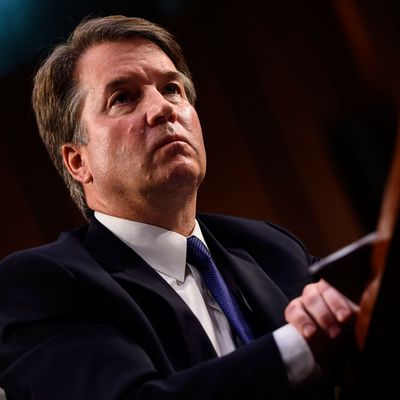
By the second day of confirmation hearings for Supreme Court nominee Brett Kavanaugh the GOP strategy has become plain: depicting this crucial addition to the Supreme Court, capping a decades-long conservative drive for a solid SCOTUS majority, as a routine matter that only fanatics and extremists could possibly find objectionable.
This bland masking of Kavanaugh’s significance was made most evident in the nominee’s own opening statement that capped Day One, a relentlessly moderate presentation, as I noted yesterday:
He certainly did not play to the president’s conservative “base.” The only Supreme Court Justices he mentioned by name were the man he seeks to succeed, Anthony Kennedy (largely hated by conservative ideologues) and Justice Elena Kagan in her capacity as his employer at Harvard Law School. There was nary a word about conservative icon Antonin Scalia, or the chief justice he has in the past cited as his “first judicial hero,” William Rehnquist. He did, however, manage a brief shout-out to D.C. Circuit Chief Judge Merrick Garland, the Obama SCOTUS appointee that Senate Republicans famously denied a hearing.
Today Kavanaugh in answering questions from Judiciary Committee members has relentlessly touted his respect for judicial precedents (though it has often elided notice that Supreme Court precedent is binding on lower courts like the one Kavanaugh has served on in the past in a way that it does not bind SCOTUS itself). He has specifically expressed respect for the “settled law” nature of Roe v. Wade and Planned Parenthood v. Casey, the cases establishing and affirming a constitutional right to abortion, which virtually all of his partisan sponsors deplore as an abomination. Listening to Kavanaugh, you’d almost think he was a judicial machine, mechanically applying “settled law” to achieve consensus results. He has also repeatedly expressed an aspiration to join a “Team of Nine” on the Court, failing to acknowledge there are hard and extremely important factions produce many crucial decisions on divided votes (often 5–4).
Judiciary Committee Republicans are contributing to this game by weeping crocodile tears over the partisan nature of the hearing (if only Obama’s nominee Merrick Garland had even been given the courtesy of a partisan hearing!), with Lindsey Graham in particular pursuing this angle, as a live-blog indicated:
Sen. Lindsey Graham (R-SC) now doing some defense work for Kavanaugh after the Leahy questions. “You will probably get about 55 votes,” Graham says. “In other times, someone like you would probably get 90 votes.
Graham also tried to compare Kavanaugh to Justice Sonia Sotomayor, who told the Judiciary Committee that she reflected the “progressive philosophy of judging” of President Obama, just as Kavanaugh reflected the “philosophy of judging” of Donald Trump. He may have fouled up here by suggesting that Trump of all people has a judicial “philosophy” comparable to that of his predecessor, a constitutional law professor.
Democratic senator Sheldon Whitehouse further pierced the veil of bland routine surrounding Kavanaugh by raising the Federalist Society-driven vetting process that selected him (and his own predecessor, Neil Gorsuch). The judge professed not to know anything about that, which is risible. And in fact, this whole line of questioning seemed to make the smooth jurist nervous.
The reality which this combined Kavanaugh/GOP Senate performance is obscuring to the casual viewer of these hearings is the one that has not only made this nomination the subject of vast conservative rhetorical and financial investments, but is the glue that binds millions of conservative Evangelical Christians and highly influential conservative “movement” members to Donald J. Trump. This was made plain earlier this year in a “spiritual biography of the president” written by two very prominent leaders of the Christian right, reflecting on Trump’s first SCOTUS nominee:
When assessing the faith of Donald Trump, the significance of the Neil Gorsuch nomination cannot be underestimated. Of course the access evangelicals have had to this president is unprecedented and should not be overlooked. The push of the pro-life agenda was a major development as well in the first one hundred days of this administration. The confluence of all three in totality presents concrete evidence that Donald Trump is trying to live out his faith with deed.
Trump’s willingness to consummate the long-planned conservative ideological takeover of the Supreme Court — and to make not just vague promises, but to prepare an exclusive “list” of prospects prepared by the Federalist Society and the Heritage Foundation — has led innumerable conservatives to suspend their misgivings over this strange man’s hostile takeover of the GOP and stay in line. That the Republican members of the Judiciary Committee (and Kavanaugh himself) are pretending this dynamic doesn’t exist is more outrageous than the shouts of protest at the hearing which has so annoyed the senators.
The revolution Kavanaugh is being designated help consummate will most definitely include modification if not complete repeal of the constitutional right to choose abortion. Every GOP member of the Judiciary Committee is a faithful support of the anti-abortion movement that has made a shift in the Court its prime goal for decades. Senator Mike Lee (himself a member of Trump’s SCOTUS list), who as I type this is engaged in an elevated discussion of constitutional law with Kavanaugh, had this to say at the last March for Life in Washington:
[O]n this forty-fifth anniversary of Roe v. Wade, let us respond to Roe as Frederick Douglass responded to a similar indignity, Dred Scott v. Sandford.
“Happily for the whole human family,” Douglass thundered, “their rights have been defined, declared, and decided in a court higher than the Supreme Court.”
Those words are as true today as they were when they were spoken.
There’s nothing routine about this nomination. It’s a turning point, just as Trump planned.






























